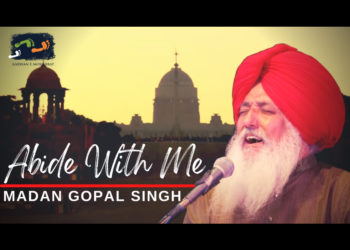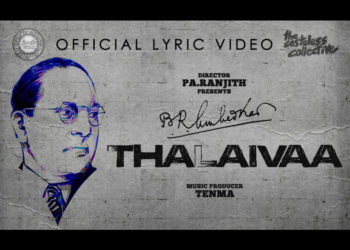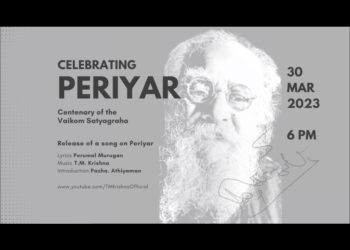Released on 6th September, the second edition of TM Krishna‘s (@tmkrishna) Edict Project in collaboration with Ashoka University aims at creating vibrant academic, socio-political and aesthetic conversations around the edicts of Ashoka.
This edition explores the theme “Ashoka and Memory” through musical renditions, conversation and theatrical imagination.
Musical rendition by TM Krishna
A conversation with historian Nayanjot Lahiri
‘Nott’ The Earthen Pot: A Film by MK Raina
Minor rock edict 1 (at Rupnath, Madhya Pradesh)
True people and false gods
[…] Devāṇam piye āṇapayati.
adhikāni aḍhātiyāni vasāni ya hakaṃ sake.
no tu kho bāḍhaṃ pakaṃte husaṃ ekaṃ savaccharaṃ.
sātireke tu kho saṃvachareṃ,
yaṃ mayā saṃghe upayīte bāḍhaṃ ca me pakkaṃte.
iminā cu kālena amisā samānā munisā Jambudīpasi misā devehi.
pakkamassa hi iyaṃ phale.
Ashoka Devanampriya declares –
Over two years are past
since I became a believer.
One year went by — I did not reflect.
It has been another year
since I joined the Order
Now I have been thinking — quite a bit.
In all this while
I realized
truth is found amidst humans
in India
and falsehood among the gods.
This is what I think.
Major rock edict IV (at Erragudi, Andhra Pradesh)
The Drumbeat of Justice
atikaṁtaṃ aṃtalaṃ bahūni vassasatāni,
vaḍhito eva pāṇālaṃbho vihiṃsa ca,
bhūtānāṃ ñātisu asaṃpaṭipatī,
bamhaṇa-sramaṇānāṃ asaṃpaṭīpatī.
ta ajā Devānaṃpiyasa Piyadasine lājine dhaṃma-calaṇena
bherīghoso aho dhaṃmaghoso.
yādisā bahuhi vassasatehi nā hutapuluve,
tādise ajā vaḍhite Devānaṃpiyasa Piyadasine lājine dhaṃmanusaṭhiye;
anālaṃbhe pānānaṃ, avihiṁsā bhutānaṃ, nātisu saṃpaṭipatī,
baṃbhana-samanānaṃ saṃpaṭipatī, mātā-pitisu sususā …
For years, killings
and cruelty,
bitterness in families
and strife between religions
were on the rise.
Now, in Ashoka’s law
the drums of war
strike the rhythm of Justice.
Now, like never before
people nor animals fear for their life
brothers are at peace,
these devout ones respect those others,
and elders are honoured.
Major rock edict VI (at Erragudi Andhra Pradesh)
A Time for Governance
Devāṇaṃpiyo Priyadraśi rañño evam āha.
atikaṁtaṃ aṃtalaṃ na bhutapruvaṃ savvaṃ kalaṃ,
aṭha-kramaṃ va paṭivedana va.
taṃ maya evaṃ kitaṃ.
savvaṃ kalaṃ: aśamanassa me, orodhanassi, grabhagarassi,
vracasi, vinitassi, uyyanassi,
savvatra paṭivedakā aṭṭhaṃ janassa pativedetu me.
savvatra ca janasa aṭha karomi
savvatra ca aṭham janasa karomi ahaṃ.
For too long now,
nothing was done for the people,
their voices weren’t heard.
This is my decree —
The people can appeal to me any time –
whether I am dining, resting,
in bed, in the washroom,
working out, or in the garden.
I will strive for the people
everywhere,
anywhere.
Pillar edict seven (Delhi-Topra at New Delhi and Haryana)
Talking fair, Doing fair
kina sujane anulupāyā dhaṃma-vaḍhiyā vaḍheyā ti.
kinasu kāni abhyuṃnāmayehaṃ, dhaṃma-vaḍhiyā ti .
etaṃ Devānaṃpiye Piyadasi lājā hevaṃ āhā. esa me huthā.
dhaṃma-sāvanāni sāvāpayāmi, dhaṃmānusathini anusāsāmi.
etaṃ jane sutu anupaṭīpajīsati, abhyuṃnamisati.
etaṃ jane dhaṃma-vaḍhiya ca baḍhaṃ vaḍhisati.
How do you teach justice?
How do you get people to sustain justice?
King Asoka, Devānaṃpiye Piyadasi says:
Here is what I think –
I will spell out justice. We shall speak about it.
People will hear and heed.
They will reflect on what is just.
They will sustain it.
Willingly.
Major rock edict XIII (at Shahbazgarhi, NWFP, Pakistan)
War and Peace
aṭha-vaśa-abhisitaṣa Devanapriyasa, Priyadasisa, rañño Kaliṅga vijita.
adiaḍha-mātre praṇa-sata-sahasre ye tato apavuḍhe,
śata-sahasra-mite tatra hate; bahu-tavaṁtake va maṭe.
tato pachā adhuna ladheśu Kaligeśu tivre,
dhrama-śilana dhrama-kamata dhramanuśasti ca,
Devanapriyasa so asti anusocana –
“Devanapriyasa vijiniti ca Kaligani (…)
avijitaṃ hi vijinamano yo, tatta vadha vā, maraṇam vā, apavaho vā janasa.
taṃ baḍhaṃ vedaniya-mataṃ guru-mataṃ ca Devanaṃpriyasa”(…)
yo pi ca apakareyati kśamitaviyamate va Devanaṃpriyasa;
yaṃ śako kśamanaye, ya pi ca aṭavi Devanaṃpriyasa vijite bhoti, ta pi anuneti; anunijapeti anutape pi ca prabhave Devanaṃpriyasa(…)
In the eighth year of his rule,
king Asoka conquered Kalinga.
One hundred and fifty thousand men
lost their homes
one hundred thousand in number
were maimed
and many more died.
Even since he won Kalinga,
Ashoka has striven to practice and foster justice.
He wonders about this ‘victory’
He repents his wars –
the killing, dying and displacement.
Ashoka rules his rivals.
and the folk of his forests.
They know
his might
and his kindness.
They will keep away
from crime and violence.




